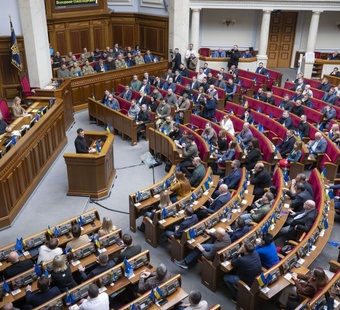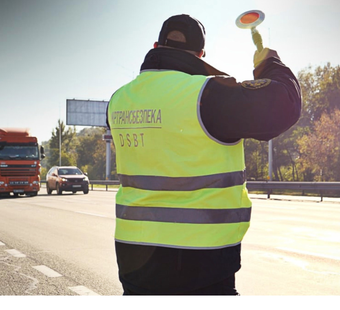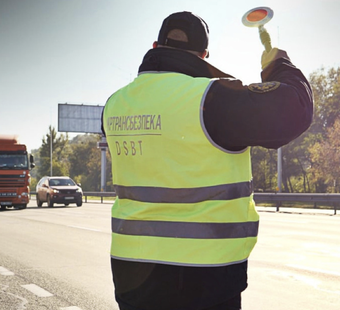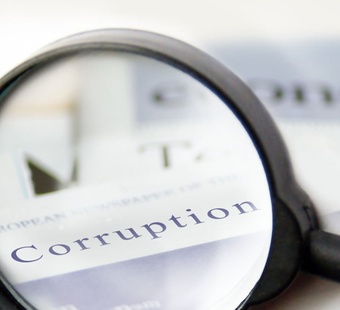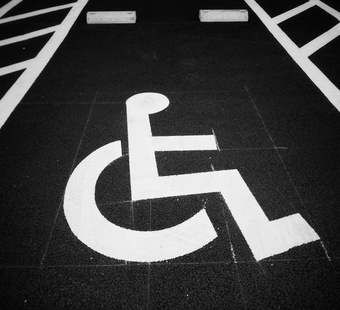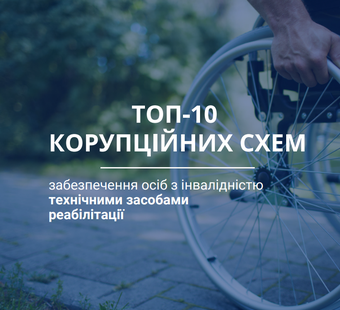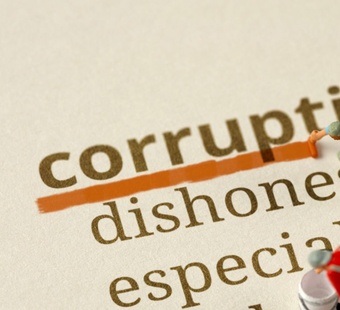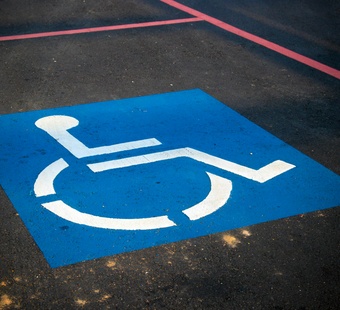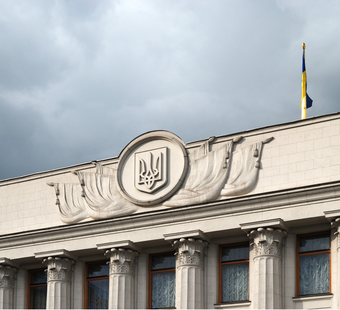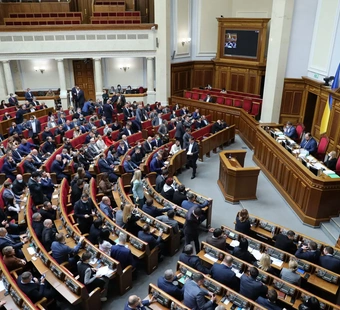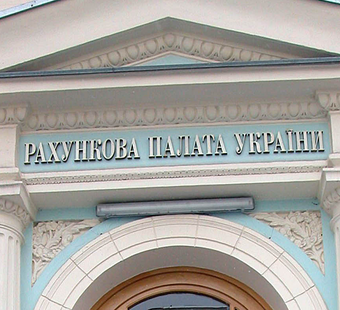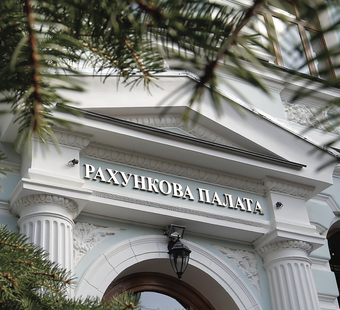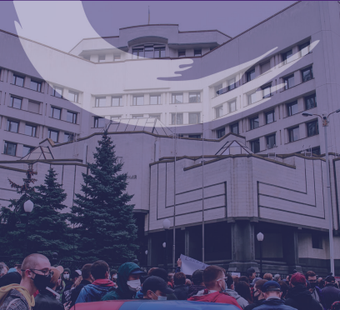>
Analytics>
Lessons from the July crisis – how to preserve the independence of institutions under pressure from war, politics, and populismLessons from the July crisis – how to preserve the independence of institutions under pressure from war, politics, and populism

Introduction


“Why do I need a system that works against me?” - this slogan became the symbol of the July 2025 crisis. It was chanted at the first mass protest since the start of the full-scale war, triggered by the adoption of Bill No. 12414, which restricted the independence of anti-corruption bodies. It was also the slogan of the MPs who voted for the bill.
This episode is neither exceptional nor accidental - it fits logically into the ongoing dynamics of systemic pressure on the anti-corruption infrastructure that has been ongoing since its creation. As participants in its formation, we are aware that as long as the system is effective and politically independent, there will be attempts to undermine its independence.
The confrontation will be constant, as not only internal players (from the authorities to opposition politicians linked to certain old and new oligarchic circles) are interested in delegitimizing these bodies, but also Russia, which is seeking at any cost to undermine trust in the state from within and among external partners.
Certain signs of preparations for another wave of attacks were expected closer to the autumn political cycle, but the events of July came as a surprise due to their rapid pace - the law was passed in a matter of hours, rather than weeks or months, as had been the case previously.
Despite public opposition and a temporary rollback of the changes, the situation has exposed the vulnerability of the state architecture. Today, there is a chance not just to react, but to strengthen the institutional resilience of the state.
This document contains a brief analysis of the political and legal context surrounding the adoption of bills No. 12414 and No. 13533, an assessment of their impact on the anti-corruption and law enforcement systems, and a set of practical recommendations for strengthening institutional independence, transparency of decision-making, and the resilience of democratic architecture in wartime.
Context and background

What happened, why it happened, and what it means for the rule of law

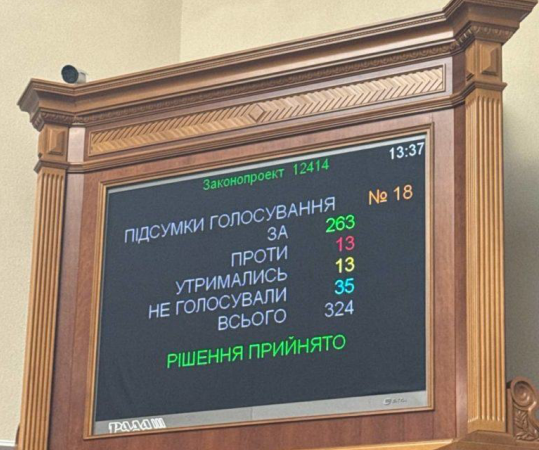
On July 22, 2025, the Verkhovna Rada of Ukraine passed bill No. 12414 in a matter of hours, transforming the criminal justice system with regard to anti-corruption and law enforcement agencies. The official argument was to supposedly cleanse anti-corruption agencies of "Russian influence”. However, the main reason was the desire to limit investigations into individuals politically close to the authorities. The law was sharply criticized by civil society, anti-corruption experts, and international partners, and sparked the first mass protests since the start of the full-scale war. In response, on July 31, a "compensatory" bill No. 13533 was passed, which partially repealed the dangerous provisions of the previous law.
Along with the adoption of draft law No. 12414, international media reported on the possible imposition of sanctions against Tomas Fiala, owner of the investment company Dragon Capital, which owns influential Ukrainian media outlets, including Ukrainska Pravda. The publication is known for its anti-corruption investigations, particularly those concerning the President's inner circle. Although the sanctions were not imposed, this situation sparked a wave of criticism and yet another debate about the risk of sanctions being used for purposes other than those intended, which undermines confidence in the entire sanctions system, despite its importance and effectiveness as a national security tool.
This episode was a turning point, demonstrating how vulnerable institutional independence remains in Ukraine even during wartime, and how important the response of society and the international community is to preserving the basic principles of the rule of law.
What has changed, what has been restored, and what risks remain

Legal analysis of draft laws No.12414 and No.13533 and systemic problems that pave the way for new interventions

The original law gave the Prosecutor General the right to interfere in the work of anti-corruption bodies, change the composition of teams of prosecutors, initiate the transfer of cases, and removed the NABU and SAPO from real procedural self-government. For more details, see https://izi.institute/analysts/97357/
According to the analysis of the Institute for Legislative Ideas, draft law No. 13533 generally restored the procedural independence of NABU and SAPO, in particular:
- the procedural autonomy of the SAPO and NABU was restored (the right of the SAPO head to exercise full control over SAPO prosecutors, the right of the SAPO to directly coordinate the actions of NABU detectives, and the powers of the Prosecutor General to interfere in the jurisdiction, personnel decisions, and approval of procedural actions in NABU cases were removed).
- a number of provisions that expanded the Prosecutor General's control over the anti-corruption infrastructure were repealed (the right to independently resolve disputes over jurisdiction, approve agreements with suspects, give instructions to detectives, influence procedural decisions in cases involving top officials, or appoint prosecutors in proceedings without the participation of the SAPO, among others).
The only exception is the mandatory polygraph test, which, despite certain reservations, is common for other law enforcement agencies, albeit without proven effectiveness.
A detailed legal analysis of the adopted law is available here (Annex 1).
However, systemic risks remain:
A) Weakening of the independence of the prosecution service in general
Despite the restoration of the status of NABU and SAPO, other provisions of the law
- allow the Prosecutor General to dismiss prosecutors on the grounds of reorganization;
- retain the possibility of appointments without open competitions (previously, competitions were mandatory and included an assessment of the prosecutor's professional level, experience, moral and business qualities, and verification of their readiness to exercise powers in a higher-level prosecution body).
B) Risks of political influence in other law enforcement agencies
The situation exacerbates the issue of independence in other agencies, in particular the BEB (whose new head was appointed after lengthy resistance) – they remain a potential tool of pressure due to the provision granting the Prosecutor General the exclusive right to resolve disputes over jurisdiction in criminal proceedings that may fall within the jurisdiction of this agency.
C) Discrediting the issue of national security
The use of rhetoric about the fight against "Russian agents" to justify restrictions on the independence of anti-corruption bodies sets a dangerous precedent. This undermines trust in the fight against Russian agents and ties to Russian capital and could have fatal consequences in the event of a real threat – the authorities may simply not be believed. The absence of legislation regulating relations with entities linked to the aggressor country creates legal uncertainty and fertile ground for manipulation
Who supported it and why

The political logic behind the vote – from party discipline to pro-Russian narratives

- A) Complete dependence of part of parliament on the Office of the President
Most Servant of the People MPs vote for decisions proposed by the Bankova without even analysing them in depth. During wartime, most MPs do not risk publicly opposing the President's decisions, so they supported him as part of party discipline. For many, it was easier to support the law than to risk political isolation or accusations of "working for the enemy."
Some MPs were told that the changes had been agreed with partners (the US and the EU) in order to present the vote as safe and necessary for "strengthening the fight against Russian agents." This argument turned out to be false, but it played a role in the quick vote.
- B) Support from MPs who are in conflict with the anti-corruption system.
31 MPs are under criminal investigation by NABU. Therefore, some of the MPs involved in NABU's criminal proceedings traditionally support the weakening of NABU and SAPO institutions.
- C) Restoration of "sovereignty" over anti-corruption bodies
The argument about “external control” due to the participation of international experts in selection committees was used not only by some members of the Servant of the People party, but also by opposition politicians – publicly, to applause in the session hall. This narrative became a convenient excuse for dismantling institutional independence under the slogan of "restoring sovereignty," although in reality it weakened safeguards against political influence.
Another part of the deputies (both from the ruling majority and the opposition) supported the law, guided either by political interests or a misunderstanding of the system of checks and balances. For many, especially those who work closely with law enforcement agencies, the existence of independent institutions such as NABU or SAPO is perceived as a "breach of unity" or an obstacle to operational coordination.
- D) Failure to use legal instruments that could have suspended the law
Neither the parliamentary committee nor other parliamentary bodies stopped the bill from passing. An anti-corruption review, which could have been initiated by the NACP, would have allowed the law to be suspended for 10 days. However, the agency did not initiate the procedure. The Public Council under the NACP, of which ILI is a member, submitted an official request to the agency; the NACP's response is attached to this analysis.
What stopped the attack

Protests, international pressure, and reputational consequences

Protests
These were the first mass street protests since the start of the full-scale war. And it was not just about protecting NABU and SAP, but about protecting basic democratic principles.
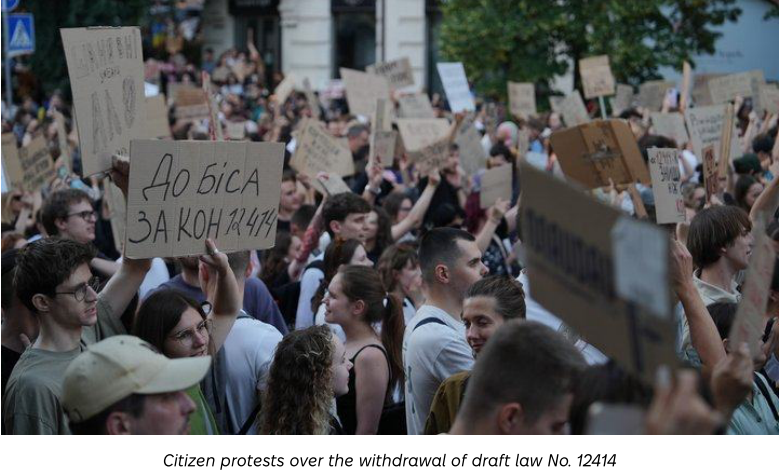
In the context of postponed elections and martial law, when political democracy is formally restricted, society demonstrated a high demand for justice, accountability, and the right to be heard. These protests showed that civic maturity and democratic thinking in Ukraine have not only been preserved but also strengthened during the war. Therefore, in order to prevent their recurrence, the authorities will have to lift the restrictions on openness (broadcasting of meetings, competitions for positions, etc.) that were introduced at the beginning of the full-scale invasion to reduce tensions. Both the authorities and society understand that protests are a last resort, as they are very susceptible to being exploited by hostile agents to shift the narrative toward "anti-government" sentiment (which has already been used during recent events).
International financial support as a condition
The EU and other international partners have publicly and unofficially signaled that the loss of independence of the anti-corruption system is a red line that calls into question not only financial support but also integration negotiations. As in the period after 2014, it is dependence on aid (including new tranches and integration negotiations) that is forcing the authorities to roll back legislative initiatives that have undermined the anti-corruption system.
Resonance in the international media
Critical reports in the international media posed a direct threat to the reputation of the President and Ukraine as a whole. This forced the authorities to react quickly, which probably influenced the adoption of the compensatory law no less than internal pressure.
The President's communication strategy with the "reports" of the NABU and SAPO

How the president regained control over the anti-corruption agenda

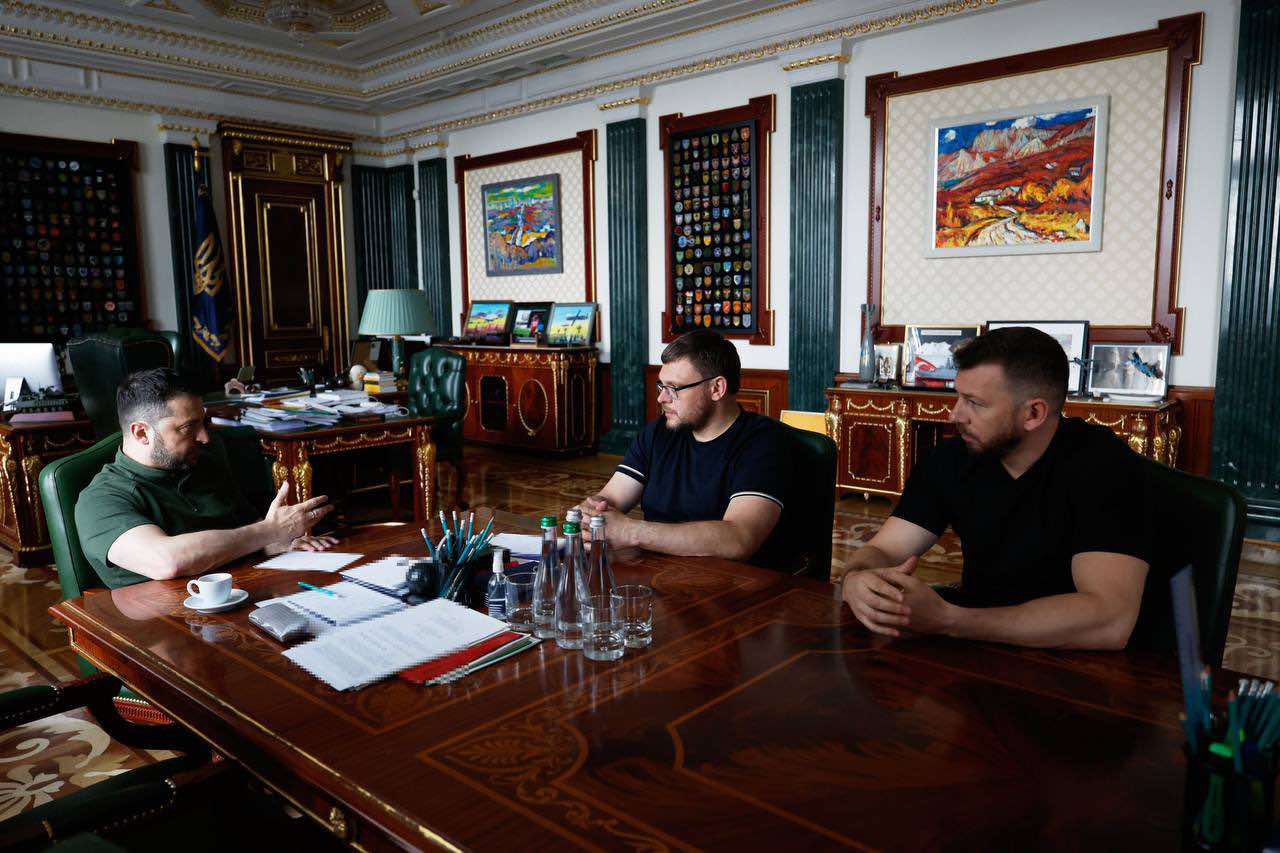
Faced with a reputational crisis, the president's office has shifted to active communication. In particular, a meeting with the heads of the NABU and SAPO, who reported on high-profile investigations following the adoption of the law, became part of a strategy to regain control over the anti-corruption narrative. Part of society criticized such "reports" from the heads of anti-corruption agencies after mass protests for their independence. Despite this, it is important to understand that:
- NABU is required by law to inform the president about its activities (Article 26 of the Law of Ukraine “On the National Anti-Corruption Bureau of Ukraine”);
- public communication between the president and anti-corruption agencies does not undermine their independence, but rather is an attempt to restore the balance of reputation after the crisis. After mass resistance, the authorities lost the initiative in the information field. A public meeting with the heads of NABU and SAP allowed the president to demonstrate that "everything is under control," "institutions are working," and "there is no conflict." The meeting was not about the content of the investigation, but more about a public symbol of unity.
- In wartime, demonstrative confrontation with the Supreme Commander-in-Chief is politically dangerous. If institutions show a willingness to engage constructively, they reduce the risk of aggressive attempts at revenge (at least in the near future) and increase the time available for effective work.
In a state of martial law, when conflict between the authorities and anti-corruption institutions can be exploited by external enemies, public "reconciliation" is a rational tactical move.
It is expected that anti-corruption issues will become a key element of the authorities' internal and external communication in order to mitigate the damage caused by the adoption of the controversial law.
What to do next

Recommendations for long-term institutional sustainability and restoring trust

Although draft law No. 13533 formally restored key elements of the independence of NABU and SAPO, the situation remains far from stable. Given the political logic and previous experience, attempts at renewed interference remain likely, especially as election cycles approach. However, subsequent attacks are unlikely to be as straightforward or drastic as in the case of draft law No. 12414. Instead, gradual, piecemeal changes disguised as technical clarifications, “optimization” of powers, or increased parliamentary control can be expected.
In addition, information campaigns aimed at delegitimizing independent bodies by focusing on their "inefficiency," "elitism," "external control," etc., may play an important role.
Despite the risks, the situation also creates new opportunities. The authorities will seek to demonstrate balance through constructive reform measures – he head of the BEH has already been appointed (whose appointment had been delayed for months due to “Russian ties”), and competitions for the heads of customs and ARMA are also expected to be launched.
With active participation from the public and partners, these processes could proceed much more smoothly and with less bloodshed than before.
This window of opportunity should be used to ensure transparent competitions and promote important reforms. The primary task remains to strengthen institutional capacity through personnel and regulatory decisions.
Therefore, it is necessary to:
- Gradually expand the architecture of politically unaffiliated institutions not only in the anti-corruption sphere, but also in the areas of economic competition, state asset management, security, customs, and tax policy. The broader the network of independent institutions with protected from political influence and dismissal by management, the more difficult and expensive it is for any political center to control the system as a whole. This creates a natural barrier against rapid attacks, backroom changes, and usurpation, especially in a "one night" format.
It is important to legislate restrictions on the appointment of heads of these bodies without competition or to positions of permanent acting officials. In addition, as practice shows, competitions for senior positions should be open and accountable to the public, with the publication of lists of candidates, evaluation criteria, and the commissions' motivational decisions. This will restore trust in personnel decisions and reduce the scope for behind-the-scenes influence.
- The participation of international partners in competitive procedures should be maintained, but not only through foreigners, but also through the delegation of independent Ukrainian experts with impeccable reputations who enjoy the trust of civil society and are not affiliated with any political center. This approach will help reduce political tension, avoid conflicts of interest, and neutralize toxic narratives about “external governance” that are actively used both within the country and by external destabilizing forces. Legislate to guarantee the independence of the heads of the above-mentioned bodies through fixed terms of office, prohibition of dismissal without audit, and protection from political pressure. However, without adequate funding, teams, and analytical support, even the best leader can easily be discredited as “ineffective.” Only a combination of legal protection and institutional capacity can ensure real autonomy and effectiveness.
- To regulate, at the legislative level, the long-standing issue of the status of persons connected with the aggressor state by clearly defining the criteria for such connection (citizenship, economic interests, participation in structures of the Russian Federation, etc.) and the legal restrictions applicable to such persons, and to introduce a comprehensive system of legal safeguards that, inter alia, will preclude the appointment to managerial positions of persons with ties to the aggressor state.
- Bring sanctions legislation into line with EU standards by establishing transparent and reasonable grounds for imposing sanctions, creating an effective procedure for appealing them (taking into account the need to review the restrictive position of the Supreme Court), introducing a clearly regulated mechanism for granting exemptions from sanctions, and adopting draft law No. 12406, which introduces criminal liability for violating and circumventing sanctions.
- To strengthen accountability and involve citizens in the decision-making process, it is necessary to ensure regular broadcasts of the Verkhovna Rada and its committees' meetings, publish agendas in advance, and fully implement the law on public consultations.
It is important to give active citizens the opportunity to influence through effective public councils and access to anti-corruption expertise, the conclusions of which are currently binding on legislators. Particular attention should be paid to strengthening the anti-corruption expertise of draft laws by the NACP, which should systematically use this tool, in particular to temporarily suspend the consideration of initiatives with identified corruption risks.
Annex I

Conclusions based on the results of a legal analysis of Law No. 4555-IX and draft law No. 13533

Law No. 4555-IX, which entered into force on July 23, 2025, de jure and de facto eliminated the procedural autonomy of NABU and SAPO, subordinating them to the Prosecutor General. This sparked a wave of criticism from the public, experts, and international partners, including the European Commission.
In response to public concern, on the evening of July 24, 2025, at the initiative of the head of state, a draft law was registered in parliament on amendments to the Criminal Procedure Code of Ukraine and certain legislative acts of Ukraine regarding the strengthening of the powers of the National Anti-Corruption Bureau of Ukraine and the Specialized Anti-Corruption Prosecutor's Office (No. 13533).
An analysis of this draft law leads to the conclusion that the proposed provisions generally return the legislation to the state that existed prior to the adoption of Law No. 4555-IX: the autonomy of the SAPO and NABU is restored and the influence of the Prosecutor General on their procedural activities is reduced to a minimum, the fragile system of checks and balances in the anti-corruption architecture is restored, and the new ground for entering a person's property without judicial control is abolished. This is evidenced by the following provisions of the draft law:
1) the head of the SAPO regains the status of head of the prosecution authority for SAPO prosecutors (Article 3 of the CPC);
2) the Prosecutor General is deprived of the right to issue binding written instructions to the detective unit and the internal control unit of the NABU to provide him with materials of the pre-trial investigation (Article 36 of the CPC);
3) the head of the SAPO and his deputies will regain the right to supplement, amend, or withdraw appeals or cassation complaints, as well as applications for review of court decisions on the basis of newly discovered or exceptional circumstances submitted by them, heads, deputy heads of divisions, or prosecutors of the SAPO (Article 36 of the CPC);
4) the prohibition on entrusting the pre-trial investigation of a criminal offense under the jurisdiction of the NABU to another pre-trial investigation body is restored, except in cases where there are objective circumstances that make it impossible for the NABU to function or conduct a pre-trial investigation under martial law (Article 36 of the CPC);
5) the right of the head of the SAPO to assign the NABU to investigate criminal offenses under the jurisdiction of other pre-trial investigation bodies is restored (Article 36 of the CPC);
6) the provision whereby the head of the SAPO could be appointed by the prosecutor exercising the powers of a prosecutor in a specific proceeding, exclusively by decision of the Prosecutor General, as well as the provision whereby in such cases these powers could be vested in another prosecutor of the prosecution authorities by decision of the Prosecutor General, shall be excluded (Article 37 of the CPC);
7) the right of the Prosecutor General to assign the pre-trial investigation of a criminal offense under the jurisdiction of the NABU to another pre-trial investigation body in the event of failure by the head of the NABU unit to comply with the instructions and orders of the prosecutor is abolished (Article 39 of the CPC);
8) the provision is reinstated whereby the detective unit, the operational and technical unit, and the internal control unit of the NABU carry out investigative (search) actions and covert investigative (search) actions only upon written instruction from a detective or prosecutor of the SAPO (this right is revoked for other prosecutors exercising the powers of a prosecutor in criminal proceedings) (Article 41 of the CPC);
9) The provision whereby NABU detectives may investigate criminal offences under the jurisdiction of investigators of other bodies, by decision of the Director of NABU and with the approval of the SAPO prosecutor, rather than the Prosecutor General, is reinstated (Article 216 of the CPC).
10) the exclusive right of the Prosecutor General to resolve disputes over jurisdiction in criminal proceedings that may fall within the jurisdiction of NABU is abolished, and the provision whereby such right is vested not only in the Prosecutor General but also in the head of the SAPO is reinstated (Article 216 of the CPC);
11) the new ground for entering a person's home or other property before a ruling by an investigating judge—the need for urgent seizure or preservation of evidence relating to a specific list of crimes—is abolished (Article 233 of the CPC);
12) The procedure whereby participants in criminal proceedings concerning criminal offenses committed by top officials have the right to submit a relevant motion directly to the Prosecutor General is abolished (Article 284 of the CPC).
13) the possibility for the Prosecutor General to approve the conclusion of a plea agreement between a prosecutor and a suspect or accused person in criminal proceedings for criminal offenses, the pre-trial investigation of which is conducted by NABU detectives or which has been referred to court by a SAPO prosecutor (Article 470 of the CPC), is abolished;
14) the expansion of the list of persons subject to special criminal proceedings, which provides, in particular, for the possibility of notifying such persons of suspicion only by the Prosecutor General, is abolished (Articles 480, 481 of the CPC);
15) the status of the Prosecutor General as the highest-ranking prosecutor for heads of departments, divisions, and their deputies and prosecutors of the SAPO is abolished (Article 8-1 of the Law "On the Prosecutor's Office");
16) A provision is introduced whereby NABU detectives are obliged to carry out only the instructions and orders of the SAPO prosecutor, which are given in writing. Failure by a detective to comply with the lawful instructions and orders of a prosecutor, provided in accordance with the CPC, entails liability under the law and is grounds for the detective's removal from the pre-trial investigation by the head of the pre-trial investigation body (Article 40 of the CPC).
II. At the same time, some of the provisions of draft law No. 13533 retain the innovations introduced by Law No. 4555-IX concerning the strengthening of the role of the Prosecutor General in the system of prosecution authorities:
1) The Prosecutor General retains the right to issue binding written instructions to the heads of pre-trial investigation bodies (except for the NABU) to provide him with pre-trial investigation materials;
2) the provision on the exclusive right of the Prosecutor General to resolve disputes over jurisdiction in criminal proceedings that may fall within the jurisdiction of the BEB (Article 218 of the CPC) is retained;
3) The dependence of lower-level prosecutors on the will and loyalty of higher-level prosecutors and the Prosecutor General, introduced by Law 4555-IX, is retained, primarily - by introducing a new ground for dismissal from office – disagreement with appointment to a vacant or temporarily vacant position due to changes in the structure or staffing levels, reorganization or liquidation of the prosecution authority;
4) the possibility of appointment without competition to the position of prosecutors of the Office of the Prosecutor General and regional prosecutors of lower levels remains (previously, competition was mandatory and included an assessment of the professional level, experience, moral and business qualities of the prosecutor and verification of his readiness to exercise powers in a higher-level prosecution body).
Of these provisions, the last two are cause for concern.
First, the introduction of a new ground for dismissal of a prosecutor does not preclude cases where changes in the structure or staffing of the prosecution service or its reorganization by the Prosecutor General could be a veiled means of influencing lower-level prosecutors and contributing to a reduction in their procedural independence.
It should be noted that the Constitutional Court of Ukraine has emphasized in its decisions that the independence of prosecutors is not a prerogative or privilege, but a guarantee of the fair, impartial, and effective exercise of their powers (activities); at the same time, the law should not grant the Prosecutor General discretionary powers without clearly defining their scope (Decision of the Constitutional Court of Ukraine No. 11-r(II)/2024 of December 18, 2024).
Second, the possibility of appointing prosecutors without competition contradicts the basic principles of the organization of the prosecution service and undermines the progress Ukraine has made in bringing the procedure for appointing prosecutors into line with best international practices. Finally, it contradicts the Roadmap on the Rule of Law, which sets out a set of reforms within the framework of the EU membership negotiation process, under which Ukraine has committed itself to ensuring a more transparent and merit-based selection of prosecutors for senior (administrative) positions in the Office of the Prosecutor General (head and deputy head of the department), regional and district prosecutor's offices (head and deputy head of the prosecutor's office, department within it), which includes:
- clear criteria for evaluating candidates for the position, including professional competence and integrity;
- a transparent, competitive, and meritocratic selection procedure that includes verification of professional competence and integrity;
- strengthening the institutional capacity and powers of the Office of the Prosecutor General and prosecutorial self-government bodies, in particular the Council of Prosecutors of Ukraine, with regard to the selection of prosecutors for managerial (administrative) positions.
III. In addition, draft law No. 13533 also introduces separate innovations – provisions that were absent from the legislation both before and after the adoption of Law 4555-IX. They can be seen as a kind of compromise between restoring the autonomy of the SAPO and NABU and the stated need to cleanse these bodies of potential agents of the aggressor state:
1) polygraph tests will be introduced for law enforcement officials (including NABU and SAPO) who have access to state secrets, to check for actions in favor of the aggressor state, by the relevant internal control units of these bodies at least once every two years;
2) The Security Service of Ukraine is obliged, within six months of the entry into force of the Law, to conduct checks on law enforcement officials (including NABU and SAPO) who have access to state secrets for committing acts in favor of the aggressor state.
In general, these provisions do not raise serious objections, since polygraph examinations are an established practice in the system of certain law enforcement agencies, and they will be carried out by the internal control units of these agencies (internal inspection). The SBU's verification of law enforcement officials will obviously take place within the existing powers of the security agencies, as no other draft law provides for this.
Conclusions
Conclusion: the draft law should be adopted in its entirety in order to restore the procedural autonomy of the SAPO and NABU as soon as possible.
The issue of defining the limits of prosecutors' independence and the procedure for their appointment should be resolved by a separate legislative decision







